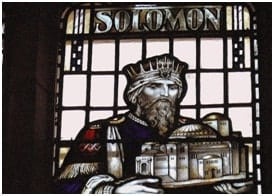
There is something magical about Christmas—something unexplainable. Many of us feel it this time of year. That “something” is manifest partly in the lights, the foods, the gifts, the songs, the parties, and many gatherings. But, it is greater than all of these combined. The wonder of Christmas is bigger than the constituent parts. What is it?
One of my favorite “obscure” Christmas texts in the Bible is 1 Kings 8.27. King Solomon had just built the great temple in Jerusalem. At the dedication, he prayed before the people and said: 27 “But will God really dwell on earth? The heavens, even the highest heaven, cannot contain you. How much less this temple I have built!”
1 Kings 6 and 7 tell us how Solomon spared no expense in building this palace for God. Its courts, main hall, inner sanctuary, careful stonework, cedar roof, wooden panels, golden furnishings, made it one of the most magnificent structures of the ancient world. It was in this sanctuary, with the ark of the covenant at its center, that God would graciously fulfill his promise to live among the Israelites. The glory of his presence would fill the temple house.
Solomon was no simpleton. In building this magnificent temple he understood the majesty of God. He knew that something greater than the temple was filling it. He realized the absurdity of supposing that God could dwell on earth, let alone in this small house. For not even the highest heavens could contain him.
By the way, the early Christians who pondered the coming of Christ were no simpletons either. The message that the Son of God was coming into the world to be born as a baby stretched their categories of understanding. After hearing what would happen, Mary said “How will this be, since I am a virgin?” (Luke 1.34). People sometimes say that this incarnation business is hard for moderns to accept. Well, the truth is, it was hard for ancient people to accept as well.
The early Christians understood that this great God had accommodated himself to us. After all, he created the earth as a special place in this immense universe. He had “walked” with Adam and Eve in a garden sanctuary long ago. He had entered into a special covenant relationship with Israel. Then in Solomon’s day, his presence filled the temple. This is where his name would dwell. In all the world, this temple house would be a unique meeting place for human need and divine mercy.
Solomon was filled with wonder because this was so inconceivable to him! The one who came into the temple was not only bigger than the temple itself, but bigger than the universe.
The same thing could be said about that stable-cave in Bethlehem. In C.S. Lewis’ book The Last Battle, (From the The Chronicles of Narnia series), as the Narnians are being overrun by Calormenes, Lucy and her friends are forced into a stable. They soon discover that they had actually entered the Narnian heaven. Lord Digory said with surprise, “Its inside is bigger than its outside!” To which Queen Lucy replied, “yes, in our world too, a stable once had something inside it that was bigger than our whole world.” (p. 141)
On the first Christmas eve, Mary and Joseph knew something about the greatness of God. When they realized what was happening, just like Solomon, they were filled with wonder. The inconceivable had happened. Divine glory broke open the heavens, and entered a stable house. The divine Word stepped down, drew near, and lay in Mary’s arms. Now, something inside the stable was bigger than its outside.
And that would not be the end of the wonder. For in time, the Son of God would descend even further to the extremity of death on a cross. Not by accident, mind you, but by divine mission.
Seen in that light, this stable house would also be a meeting place for human need and divine mercy.
In the words of the Nicene Creed, which reflect the New Testament, this divine visitor is the one “Who for us men and our salvation, came down from heaven, and was incarnate by the Holy Ghost of the Virgin Mary, and was made man.” The creed goes on “and was crucified also for us under Pontius Pilate, he suffered and was buried; and the third day he rose again according the Scriptures, he ascended into heaven, and sitteth on the right hand of the Father and he shall come again, with glory, to judge both the quick and the dead; whose kingdom shall have no end.”
So it turns out that the glory in Solomon’s temple house not only sheds light on the incarnation, but sheds light on life and Christmas itself. That unexplainable magic that we sense at Christmas is not just our imagination. It is a hint of his presence. And when he is present, when we invite him into our situations, everything changes.
May the unexpected joys of his presence be yours this season.
